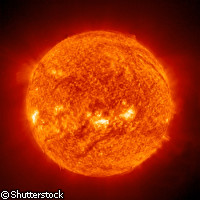Weaker Sun would not slow global warming, say researchers
A research team from the Potsdam Institute for Climate Impact Research (PIK) in Germany has found that decreased solar activity until the end of this century would only slightly scale down the global temperature rise caused by greenhouse gas emissions. The results of the study are published in the journal Geophysical Research Letters. The researchers found that the projected fall in solar activity until the end of the present century would bring down the Earth's temperature by only 0.3°C This figure is less than 10% of the projected temperature rise if we continue with the 'business as usual' scenario posited by the Intergovernmental Panel on Climate Change (IPCC). The Potsdam team based their study on the possibility of a 'Grand Minimum' of solar activity, a phenomenon that occurs when the sunspot activity on the surface of the Sun is lessened. This helps to lower the Earth's surface temperature. Sunspots (dark spots on the Sun caused by magnetic activity which reduce the Sun's surface temperature wherever they appear), can expand to around 80,000 km in diameter as they move across its surface. The Maunder Minimum, a famous period of low solar activity when very few sunspots were observed, occurred between 1645 and 1715 and coincided with the 'Little Ice Age', a period marked by freezing winters across Europe and North America. Current observation of sunspots shows that solar activity is at its weakest for nearly a century, leading to speculations by some solar physicists that we may be on the edge of a new Grand Minimum period comparable to the Maunder Minimum. But Dr Georg Feulner from the Potsdam Institute, leading author of the study, disputes this view. 'The notion that we are heading for a new Little Ice Age if the Sun actually entered a Grand Minimum is wrong,' he stated. 'In fact, a minimum of solar activity would not prevent strong future warming if emissions of greenhouse gases continued at current levels.' To explore the possibility of a 21st century Grand Minimum, the Potsdam researchers set up climate models for the oceans, the atmosphere and land surface. They looked at possible greenhouse gas emission scenarios provided by the IPCC featuring intermediate and strong rises in emissions during this century. Using the models, they performed three simulation experiments with different solar forcing - one without a Grand Minimum and two with the Sun entering a new Grand Minimum lasting until the end of the century. In these models, solar radiation fell by 0.08% and 0.25% compared to its value in 1950. Global temperatures were modelled to rise to 3.7 or 4.5 degrees Celsius above the 1961-to-1990 average level. 'Most likely, a new Grand Minimum of solar activity would diminish global mean temperature in the year 2100 by about 0.1 or 0.2°C,' commented Professor Stefan Rahmstorf, head of Earth System Analysis at PIK. 'Current temperature data also confirm that the effect of low solar activity on the climate is very small.' During the past 30 years, temperatures have increased at a rate of 0.16°C per decade. According to the Goddard Institute for Space Studies at the National Aeronautics and Space Administration (NASA), last year was the second warmest year on record globally. The authors conclude, 'A new Maunder-type solar activity minimum cannot offset the global warming caused by human greenhouse gas emissions.'
Countries
Germany



